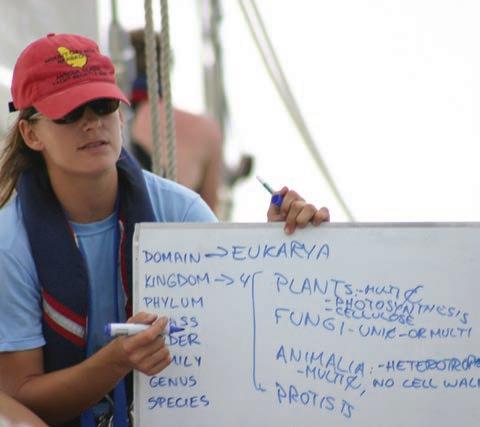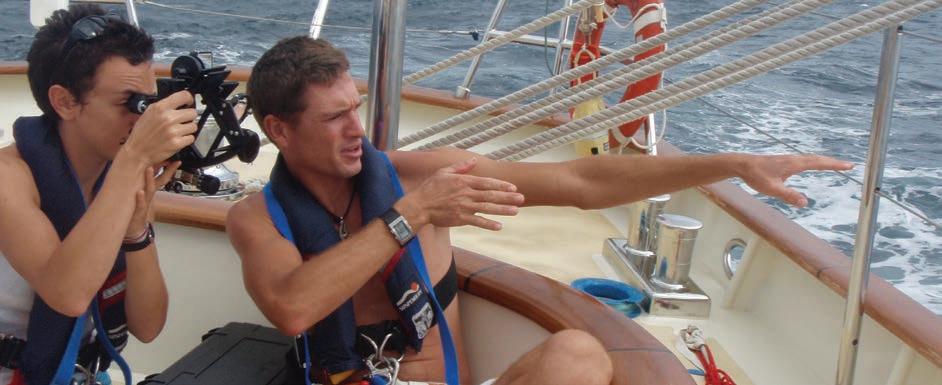
4 minute read
ACADEMIC LIFE ON-BOARD
TEACHABLE MOMENTS Academics are an integral part of every voyage; Sea|mester is, after all, an educational semester at sea. Learning aboard a ship happens in a way it never does in a traditional classroom. Here, you discover that just as the conventional walls of a classroom don’t exist, there is no bell to signal the start or end of learning. The voyage offers endless teachable moments, and they happen at all hours. For Deborah Moroney, a former Chief Scientist, a teachable moment occurred when Ocean Star sailed by Montserrat at 2 am while the island’s volcano was erupting, pouring lava down the mountain. It provided Moroney the ideal opportunity for a lesson in the volcanic formation of many of the Caribbean islands.

Advertisement
Learning the oceanographic processes responsible for the trade winds and sailing 1000 nautical miles using them.
Coming on deck in the morning to find a small squid that had misjudged its leap out the water, then holding a dissection class to discover the pen and ink inside.
Being hit in the face with a flying fish on bow watch, then examining its pectoral fins.
Learning in class about coral reefs, mangroves, sea grasses and invertebrates, then scuba diving to see it all firsthand.
What do you do when a whale breaches? According to Chief Scientist Chantale Begin, "It depends on the group at that moment. Sometimes students have so many questions, and the questions are brilliant, and everyone is so excited. And then there are other times you just shut up and let them enjoy the experience and wait until the next day to talk about marine mammals." Chantale also sees the opportunities for teachable moments in tying a lesson to the operation of the boat. "We’ll say, ‘let’s go scrub the hull so we’ll be faster on our way to Australia and we can’t bring invasive species into Australian waters.’ We can talk about native species and invasive species and tie it all together with the preparation of the boat for the voyage and perform a higher ecological mission. It’s that kind of thing that sets Sea|mester apart." Marine Science Instructor Kirsty Nash explains the teachable moment this way, "I guess the first thing that springs to mind is trying to teach abstract topics such as reef formation and the development of fringing reefs, barrier reefs, and atolls. Normally in a classroom, it is hard to relay the sense of scale and the reality of what this looks like. It comes across as an abstract construct. Then you hike to the top of Lizard Island and before you are fringing reefs in the waters surrounding the island and in the distance the ribbon reefs of the Great Barrier Reef stretching into the distance, a clear line marking the edge of the continental shelf."


45 SECONDS IS BELIEVED TO BE THE LONGEST FLIGHT BY A SPECIMEN OF THIS FAMILY. THE RECORD WAS SET IN JAPAN IN MAY 2008. THE FISH WAS ABLE TO STAY ALOFT BY BEATING THE SURFACE OF THE WATER WITH ITS CAUDAL FIN.
So instead of a classroom slide show about coral reefs you may have the opportunity, as students on Ocean Star did, to work on a project for the National Oceanic and Atmospheric Administration (NOAA) in the Caribbean, studying Elkhorn coral, the first coral listed under the Endangered Species Act. And to have a lesson on our responsibility to the ecosystems that maintain the balance of life on our planet.

Student, Abe Harder-Cattell, described the experience. "We worked in four different areas over a twoday period. At each location, two crewmembers would snorkel using underwater scooters and GPS tracking devices, while two others would dive with either Jessica Fry or Francesca Forrestal, our marine science instructors. The students working with Jessica would help to photograph the corals with identifying serial numbers and measure the colonies, noting any signs of bleaching, disease or recent mortality. The students working with Francesca would help to hammer identification tags into dead coral or rock. Our tagging, searching, and data collecting proved to be successful and at the end of the project Jessica and Francesca awarded us with necklaces made from the metal tags of colonies we were unable to locate because they had died since the last survey."

Students receive college credit from the University of South Florida (USF) for classes in Marine Biology, Oceanography, Nautical Science, and Leadership, while also earning a broad range of sailing and scuba diving certifications through International Yacht Training (IYT) and the Professional Association of Scuba Instructors (PADI).








